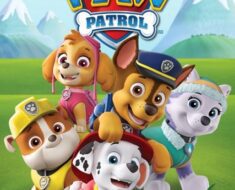Peppa Pig is one of the most popular and successful preschool animated television series in the world. The show follows the adventures of Peppa, a four-year-old anthropomorphic female pig, and her family and friends, who are also various animals. Peppa’s favourite things include playing games, dressing up, going on trips, and jumping in muddy puddles.
The show has been running for 17 years, with over 380 episodes and several specials. It has been translated into over 40 languages and broadcast in over 180 countries. It has also spawned a multi-billion-dollar franchise, with theme parks, merchandise, books, games, apps, and more.
But how did Peppa Pig become such a huge hit? What is the secret behind its appeal to children and adults alike? And what does the future hold for the little piggy and her friends? Here is the story of Peppa Pig, from its humble beginnings to its global domination.

The Origins of Peppa Pig
Peppa Pig was created by three out-of-work friends: Neville Astley, Mark Baker, and Phil Davies. The trio had worked together as animators for various studios, but found themselves without a job in 2000. They decided to team up and create their own show, using their own money and equipment.
They came up with the idea of Peppa Pig after noticing a lack of female-led preschool shows on TV. They wanted to make a show that was funny, simple, and relatable, with a strong emphasis on family values. They also wanted to use a 2D animation style that was colourful, expressive, and easy to produce.
They pitched their idea to several broadcasters, but faced a lot of rejection. Some thought the show was too childish, others thought it was too British, and others thought it was too risky to invest in a new and unknown property. The trio did not give up, and eventually found a partner in Contender Entertainment Group, a small independent company that agreed to fund and distribute the show.
The first episode of Peppa Pig aired on Channel 5 on 31 May 2004. It was an instant hit with the viewers, especially the young ones. The show quickly gained a loyal fan base, and received positive reviews from critics and parents. It also won several awards, including three BAFTAs for best preschool animation.
The Rise of Peppa Pig
As Peppa Pig grew in popularity, so did its business potential. The show attracted the attention of Entertainment One, a larger media company that acquired Contender in 2007. Entertainment One saw the potential of Peppa Pig as a global brand, and invested heavily in expanding its reach and merchandise.
Entertainment One secured deals with major broadcasters around the world, such as Nickelodeon in the US, ABC in Australia, and CCTV in China. It also launched a wide range of products, such as toys, books, DVDs, clothing, bedding, and more. It also developed a live stage show, a magazine, and a mobile app.
One of the most successful ventures was the creation of Peppa Pig World, a theme park dedicated to the show, which opened in 2011 at Paultons Park in Hampshire, UK. The park features rides, attractions, and characters from the show, and attracts millions of visitors every year. It has also inspired similar parks in the US and China.
Peppa Pig has become a cultural phenomenon, with fans of all ages and backgrounds. The show has been praised for its humour, charm, and educational value, as well as its positive representation of diversity, gender, and disability. It has also inspired memes, parodies, and even political references, such as when Boris Johnson praised the show in a speech to business leaders in 2021.
The Future of Peppa Pig
Peppa Pig shows no signs of slowing down, as it continues to produce new content and expand its empire. The show is currently in its seventh season, with a pipeline of new episodes delivering fresh content until 2027. The show has also undergone some changes, such as the replacement of the original creators and studio (Astley Baker Davies) by Karrot Animation (producers of Sarah & Duck) in 2021, and the change of voice actors for Peppa, who has been voiced by four different performers since 2004.
The show has also been exploring new formats and platforms, such as a feature film, Peppa Pig: Festival of Fun, which was released in cinemas in 2019, and a YouTube channel, Peppa Pig Official Channel, which has over 30 million subscribers and features clips, compilations, and exclusive videos. The show has also been experimenting with new technologies, such as virtual reality, augmented reality, and artificial intelligence, to create immersive and interactive experiences for the fans.
The show has also been planning new ventures and partnerships, such as a second Peppa Pig theme park in the US, which is scheduled to open in Texas in 2024, and a collaboration with Lego, which will launch a range of Peppa Pig building sets in 2022. The show has also been looking for new markets and audiences, such as India, where it has launched a Hindi version of the show in 2020.
Peppa Pig has become one of the most valuable and influential brands in the world, with an estimated worth of over $6 billion. The show has also been acquired by Hasbro, one of the largest toy and entertainment companies in the world, in a $3.8 billion deal in 2019, making the show one of Hasbro’s main properties.

Peppa Pig has proven to be a remarkable and enduring success story, that has captured the hearts and minds of millions of children and adults around the world. The show has also demonstrated the power and creativity of the UK animation industry, and its ability to create original and universal stories that transcend borders and cultures. Peppa Pig is not just a show, but a phenomenon, that will continue to entertain and inspire generations to come.
The Impact of Peppa Pig
Peppa Pig has not only been a commercial success, but also a social and cultural one. The show has had a significant impact on the lives and development of children and families around the world. The show has been praised for its educational and entertainment value, as well as its positive messages and values.
Some of the benefits and effects of Peppa Pig are:
- Language and communication skills: Peppa Pig helps children learn new words, phrases, and expressions, as well as improve their pronunciation and intonation. The show also exposes children to different accents and dialects, such as British, American, Australian, and Chinese. The show also encourages children to engage in conversations and dialogues with their parents, siblings, and peers, as well as with the characters on the screen.
- Cognitive and creative skills: Peppa Pig stimulates children’s imagination and curiosity, as well as their logical and critical thinking. The show also challenges children to solve problems, make decisions, and learn from their mistakes. The show also inspires children to create their own stories, drawings, and games, based on the characters and scenarios from the show.
- Social and emotional skills: Peppa Pig teaches children about various emotions, such as happiness, sadness, anger, and fear, and how to cope with them. The show also helps children develop empathy, compassion, and respect for others, regardless of their differences. The show also promotes cooperation, friendship, and teamwork, as well as independence, confidence, and resilience.
- Cultural and global awareness: Peppa Pig introduces children to different cultures, traditions, and customs, as well as different animals, plants, and environments. The show also fosters a sense of diversity, inclusion, and tolerance, as well as a sense of belonging and identity. The show also encourages children to explore and appreciate the world around them, and to be aware of the issues and challenges that affect it.
Peppa Pig has also had an impact on the adults who watch the show with their children, or by themselves. The show has been a source of joy, laughter, and relaxation for many parents, grandparents, and caregivers, who find the show amusing, relatable, and nostalgic. The show has also been a source of inspiration, motivation, and support for many adults, who find the show uplifting, empowering, and meaningful.
Peppa Pig has also influenced the wider society and culture, as it has become a part of the popular culture and discourse. The show has been referenced and parodied by various celebrities, politicians, and media outlets, as well as by ordinary people on social media and online platforms. The show has also inspired various trends, movements, and initiatives, such as the Peppa Effect, the Peppa Pig Challenge, and the Peppa Pig Foundation.
Peppa Pig has proven to be more than just a show, but a phenomenon, that has touched and transformed the lives of millions of people around the world. Peppa Pig has become a symbol of hope, happiness, and harmony, in a world that is often chaotic, stressful, and divided. Peppa Pig has shown that a simple and silly piggy can make a big and positive difference.
The Challenges of Peppa Pig
Peppa Pig may seem like a perfect and unstoppable show, but it also faces some challenges and risks that could affect its future and legacy. The show has to deal with some issues and threats, such as:
- Competition and saturation: Peppa Pig has to compete with other preschool shows that are also popular and successful, such as Paw Patrol, PJ Masks, and Bluey. The show also has to avoid becoming too repetitive, predictable, or boring, as it could lose the interest and attention of its fans. The show also has to balance the quality and quantity of its content and products, as it could risk overexposing or diluting its brand.
- Controversy and criticism: Peppa Pig has to cope with some negative feedback and backlash from some parents, groups, or authorities, who may find the show inappropriate, offensive, or harmful for various reasons. The show also has to be careful with its portrayal and representation of certain topics, characters, or cultures, as it could cause misunderstanding, stereotyping, or discrimination. The show also has to be aware of the legal and ethical implications of its actions and decisions, as it could face lawsuits, fines, or bans.
- Change and adaptation: Peppa Pig has to keep up with the changing needs and preferences of its audience, who may grow out of the show, or demand more variety and diversity. The show also has to keep up with the changing trends and technologies, that may offer new opportunities and challenges for its content and delivery. The show also has to keep up with the changing environment and society, that may pose new issues and problems for its message and values.
Peppa Pig has proven to be a resilient and adaptable show, that has overcome many obstacles and difficulties in its journey. The show has also shown a willingness and ability to learn, improve, and innovate, as well as to listen, respond, and collaborate with its fans and partners. Peppa Pig has shown that it can face and overcome any challenge, as long as it stays true to its vision and mission.






